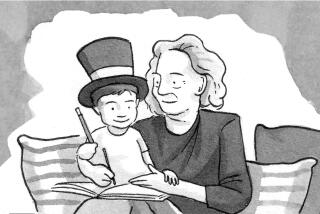‘Ax’ or ‘ask’: An earful from Times readers on proper English
In Sunday’s Times, Op-Ed author John McWhorter writes in “Just don’t ‘ax’ ”: “Few things stick out more in black American speech than the pronunciation of ‘ask’ as ‘ax.’ And when I say that it ‘sticks out,’ I’m being polite…. As a black linguist, I have come to expect that, during question sessions after any public talk I give on language, someone will ask: “What’s with ‘ax’?”
Well, asked and answered — by a few dozen Times readers, anyway.
Janet Savage of Los Angeles was offended:
“John McWhorter’s history of the modern word ‘ask’ was informative. Until it became highly offensive…. First, he says ‘even black people’ identify the ‘aks’ pronunciation as poor grammar, as if black people have a special affinity and tolerance for poor English language skills.…
“Second, I have never and will never use that pronunciation. I do not use it when I request something, and I do not use it when I am ‘most comfortable.’ I — and every black student in every English class I have been in (Stanford English major here) — have been taught to speak the current English of educated people. And most seem to do so. So who is McWhorter to declare that ‘aks’ is ‘integral’ to being black? …
“Nor do my ‘carriage, demeanor or humor’ have an ‘integral’ or ‘subtle’ relationship to my being black. Nor is my religious practice related to being black. McWhorter might be surprised to hear that I am both black and a devout atheist….
“I never ever use ‘gospel chords’ in place of a word; I am quite fond of words.…
“We need to stop telling black people that using non-standard English in everyday life is OK.”
Peter Altschuler of Santa Monica has a different point:
“McWhorter presents an historically interesting argument to give legitimacy to ‘ax’ as an alternative to ‘ask.’ But that’s not the point … or shouldn’t be….
“The objective shouldn’t be to accept cultural diversity on the basis of failure. It should be to give people the knowledge they need to adapt to different environments.
“The language that works in a mainstream business presentation is different than the language of an ethnically or culturally defined neighborhood, and people are given more options — and power — when they are able to navigate between them.”
Rory Johnston of Hollywood poses a search-engine scenario:
“Does an educated person now who says ‘ax’ write ‘ax’ or enter ‘ax’ into a search engine? Of course not. To say ‘ax’ when you know the word is ‘ask’ is an affectation.”
Robert McEwen of Cypress sees a difference between private conversations and public discourse:
“I’m confused. Is McWhorter saying that because ‘ask’ was ‘axe’ in Chaucer’s day that we should all adapt our pronunciation to the modern-day black English version of the word? Are teachers, whose evaluations may depend on how their students perform on standardized tests, supposed to tolerate, accept or even teach the black English version? …
“Everyone should learn to speak, read and write standard English. That is the most unifying and equality-producing policy.
“Spanish (and other world languages), as well as black English or Ebonics, will always exist. Speaking them in private conversations is perfectly acceptable. But when it comes to public discourse, ‘ask’ should not be pronounced ‘ax’.”
Diana Wolff of Rancho Palos Verdes seconds that:
“What is really much more important is that language, all language, with its many variations in dialectal pronunciation, is used for communication. All that is really necessary is that the person who hears it understands it….
“Everyone who hears ‘ax/aks’ knows what it means. The rest is just snobbery.”
Finally, Lisa Freedman of Valley Glen asks a question of her own:
“Now that we’ve figured out ‘ax,’ perhaps we can determine when ‘picture’ became ‘pitcher’?”
ALSO:
Gov. Jerry Brown: Is he saving California or ruining it?
Sochi suicide-bomber threat: The Olympics aren’t worth it anymore
McMath attorney: Jahi’s family aren’t fools; they deserve better than ignorant attacks
More to Read
A cure for the common opinion
Get thought-provoking perspectives with our weekly newsletter.
You may occasionally receive promotional content from the Los Angeles Times.






